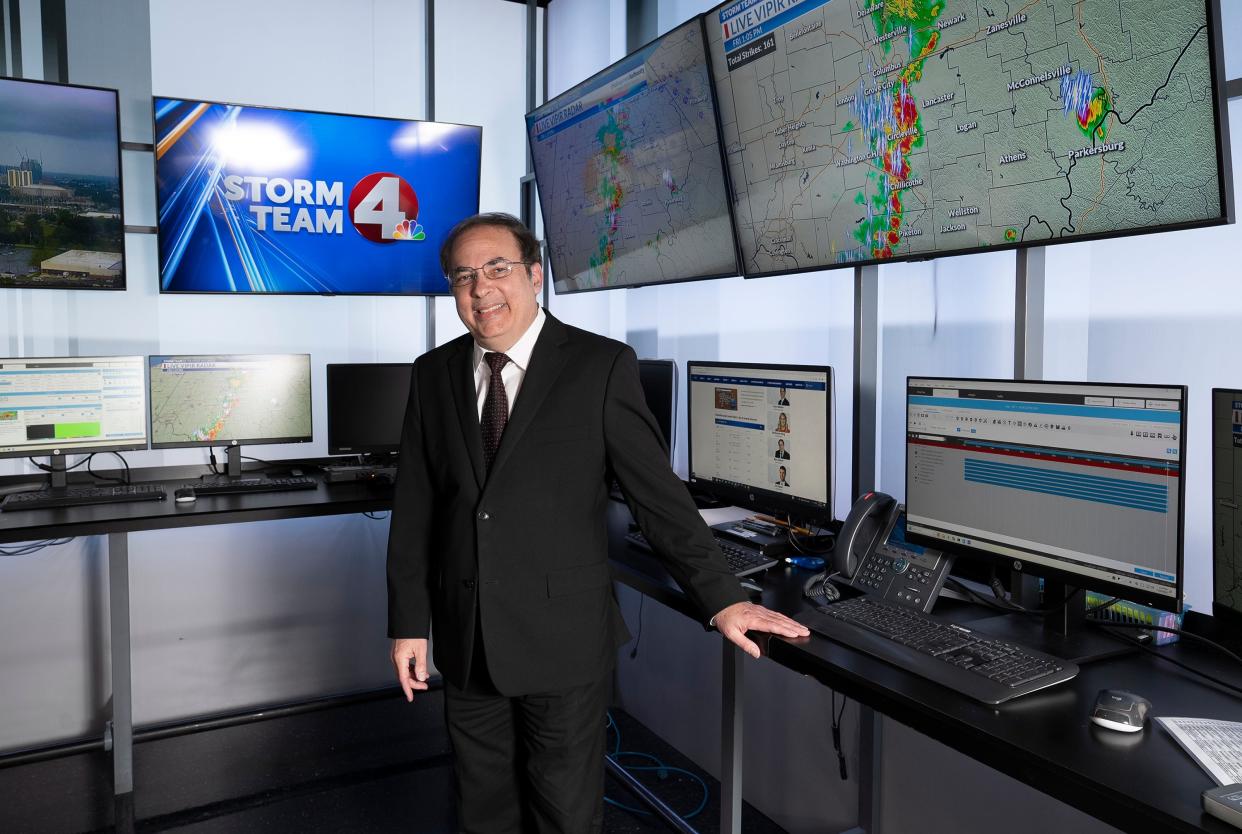Should Columbus meteorologists blend climate change into forecasts?

As record heat grips much of the U.S. and all-time temperatures are being set, catastrophic flooding and wildfires ravage other parts. Arctic ice sheets are melting faster than predicted, raising sea levels. Oceans around Florida and the Caribbean are nearing hot-tub levels, killing marine life.
We hear about these calamities almost daily, some of them in weather forecasts. What we don't hear within the typical happy banter of broadcast news is any mention of climate change, either man-made or natural.
Not even a passing reference.
In a recent 2-minute segment on flooding, CNN meteorologist Derek Van Dam summed up: "We're talking about flood threats, bad quality of air and then excessive heat. I mean 'Wow,' " he said, smiling, "Summertime, here it is."
Some feel that daily forecasts are missed opportunities to inform the public about the growing impact of climate change. Others, however, are put off by what they say is unsettled science.
Meteorologists say that their role is specific: "Protection of life and property through forecasts and warnings over several days or weeks," said Seth Binau, chief science director at the National Weather Service in Wilmington.
Anything beyond short-term weather forecasting would be out of the scope of the typical meteorologist's expertise, and better left for climate scientists.
But climate scientists, or climatologists − whose expertise is the long-term study of changing weather over decades or centuries - aren't the ubiquitous figures we see daily on television.
"I think that we're struggling, even among experts in other fields such as economics, to communicate the seriousness of the risks in ways that the public audience can pick up and use," said Paul Higgins, associate executive director of the Washington D.C.-based American Meteorological Association. "The climate is changing faster and larger than any changes humanity has gone through since our transition to agriculture in the last 5,000 to 10,000 years."
More: 'It's us,' 'there’s hope,' and 4 other things we must face about climate change| OSU experts
Climate change is happening, reputable scientists agree. And while their daily forecasting counterparts, who are also scientists, may agree, most shy away from even broaching the topic during their daily 2-to-3 minute television and radio segments.
"This particular topic has so much passion and politics that can trump even the science," said Binau. "I think it's something that's on every meteorologist's mind."
Climate forecasts lead to death threats
Chris Gloninger, former chief meteorologist at KCCI-TV in Des Moines, Iowa, says he was hired two years "to shake things up" by introducing science and climate trends into his on air segments. But after he began doing so, there was pushback from some in his conservative community. Then a death threat.
In lengthy letters, the man was specific, demanding his address, insulting his family and calling his forecast a liberal conspiracy and "Biden hoax," Gloninger told The Dispatch.
That forced him to quit this year and move to Boston and a job as a senior scientist for a coastal engineer consultancy.
Gloninger said he agrees that a meteorologist's main role is to keep the viewing public safe. "But when there isn't severe weather moving through, I think that it's the prime time to talk about climate change," he said.
Not doing so? "I think it's missed opportunity," he said.
Asked if meteorologists and news directors could do more, Aaron Wilson, state climatoloist for Ohio, said "They have that platform, but that's a business decision."
"I do think it's a missed opportunity to reach a wider audience ... to those who have to make decisions about climate," Wilson said.
Gelber seeks to explain trends
Locally, Ben Gelber, a meteorologist for 43 years at NBC4-WCMH, has reported on climate issues, ice core analysis and past and current composition of the atmosphere. But not during his forecast.
There simply isn't enough time, he said, considering the public simply wants to know about rain, heat or storms to be able to make plans.
His science segments are often during the weekend.
"The important question I have addressed in stories is whether current observable trends are occurring at a more rapid rate than in the past."
Gloninger had a similar approach, but during his forecast. He said he'd show trends and graphics that support the science, such as carbon dioxide levels superimposed over global average temperatures.
"I thought that it was a way to show that we are causing the climate change that we are seeing. It's not your imagination that this is happening more.
"Science is not a theory. It is fact-based and provable," said Gloninger. "And it doesn't get the time that it deserves on the national or local level."
"Aside from your doctor, we're the only scientists that people are going to come across in their daily lives," Gloninger said.
Climate Central, a New Jersey-based foundation and government supported 10-year-old program to help support television (TV) weathercasters across the United States, says that there is demand for "dual-purpose" forecasts.
"We're seeing more indications that audiences want it. People are curious," said spokesman Peter Girard. "We do know of complaints that stations get. But it's far more often positive."
He cited a recent Youtube video of Charlotte meteorologist Elisa Raffa as an example of melding climate science into meteorology.
For his part, Gelber, who said he's gotten no negative feedback from his reports, will continue to educate, but not in a preachy manner.
"I feel my responsibility, as a broadcast meteorologist and teacher, is to explain the discernible trends and probable linkages in the context of historical data, and that our viewers and online readers will draw their own conclusions based on the best available data from accredited research centers such as NASA, NOAA and Ohio State."
Of Columbus' three local TV stations, only WCMH and Gelber agreed to a Dispatch interview.
dnarciso@dispatch.com
This article originally appeared on The Columbus Dispatch: Should Columbus meteorologists blend climate change into forecasts?

